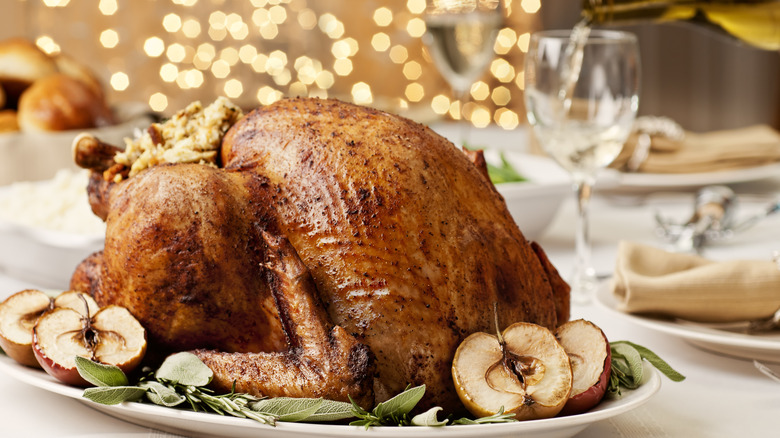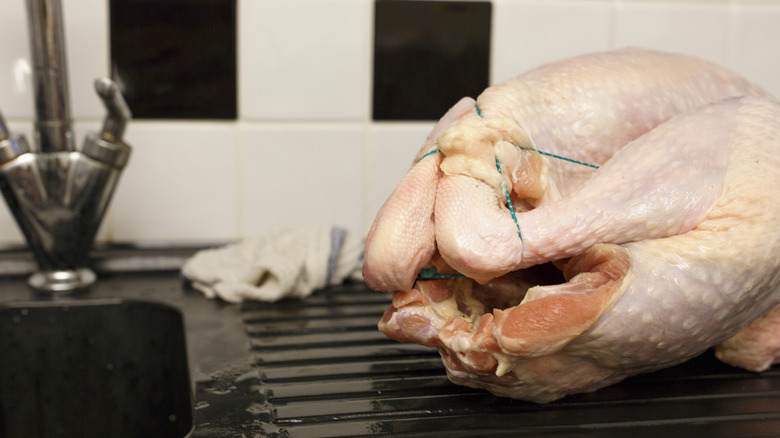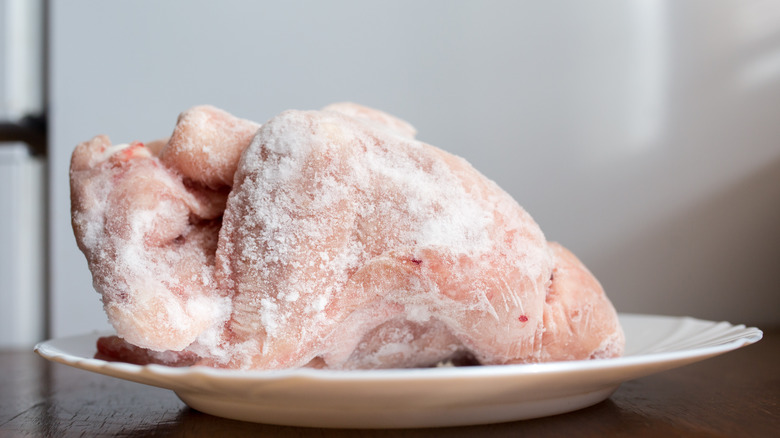How Long It Actually Takes To Thaw A Turkey
Turkey is perhaps one of the most intimidating pieces of poultry to cook. Usually reserved for holidays such as Christmas or Thanksgiving, prepping and cooking a turkey is always an event because it requires ginger care and close attention to detail. One of the most stress-inducing aspects of turkey preparation is thawing because unfreezing your bird properly is essential to achieving an even cook and safe result. And how do you calculate how long to thaw your turkey?
The USDA recommends measuring out the time by weight, suggesting a full day of thawing for every 4-5 pounds of turkey. This would mean that a 20-pound bird should thaw in the fridge for roughly five to six days. The refrigerator thawing method allows you the most time for your turkey prep and also ensures that your turkey stays at a safe temperature while thawing. Once thawed, a turkey can remain safe to eat if kept in the fridge for a further one to two days, giving home cooks plenty of leeway for other prep work. Of course, there are also other ways of thawing your turkey, and calculating the thaw times for those methods will make your turkey prep just a bit more complicated, but time crunch-friendly.
Thawing in water
Though refrigerator thawing is the preferred method for both safety and achieving an even temperature, other methods can come in handy if you're pressed for time, such as cold water or microwave thawing.
Cold water thawing your turkey is a great way to bring your bird to temperature within a day of serving. To thaw your turkey using this method, you will want to completely submerge it so that no part of the bird is exposed. It's of crucial importance to monitor the water's temperature while your turkey is thawing, ensuring it does not go above 40 degrees Fahrenheit. You'll also want to allow 30 minutes of soaking for every pound, meaning larger turkeys will take some time, and require more changes of water. And if you want to pull double duty, you can also brine your turkey as you cold water-thaw it.
When using the cold thaw method, make sure to either keep your turkey in its original plastic wrapping or place your turkey in a sealed plastic container to prevent your it from contaminating surrounding surfaces. And cold-water thawing should never be used if you intend to refreeze your turkey as meats left outside of the fridge for more than two hours are not safe to refreeze.
Pulling double duty
Now, if you're really on a time crunch (or don't want to wake up in the middle of the night to give your turkey a cold bath), you can always try thawing your bird in the microwave. But before you begin to thaw your bird using this method, you should unwrap your turkey and place it on a microwave-safe plate. And remember to set your microwave to defrost (rather than cook) before you begin. General guidance is to heat your turkey for six minutes per pound, flipping and rotating as it thaws.
However, microwave thawing can cause premature cooking, especially if you're thawing an entire turkey. If this happens, you should let your turkey rest for about five minutes before resuming your thaw, and always make sure to check your microwave's size and weight capacity before attempting this method. Microwave thawing should not be your go-to option for a whole bird. However, you might want to choose this method if you're not cooking a whole turkey, but rather cooking your turkey in parts. This will help prevent premature cooking or an uneven thaw. Thaw times will vary based on your microwave's capacity, however, general guidance suggests you defrost for eight to ten minutes of defrosting per pound of meat. To find further food preparation guidance, you can check out the FDA's official holiday food safety page, which can help you with your meal preparations, festive or otherwise.


